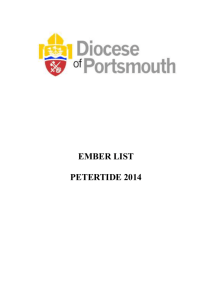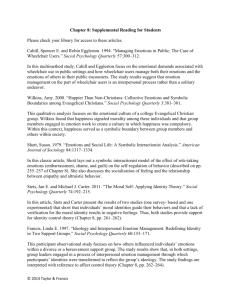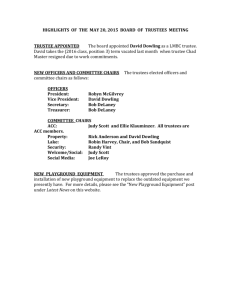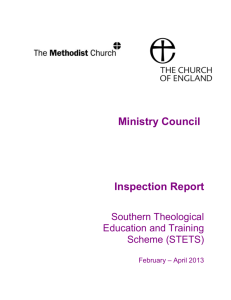(STETS): follow-up report August 2014
advertisement
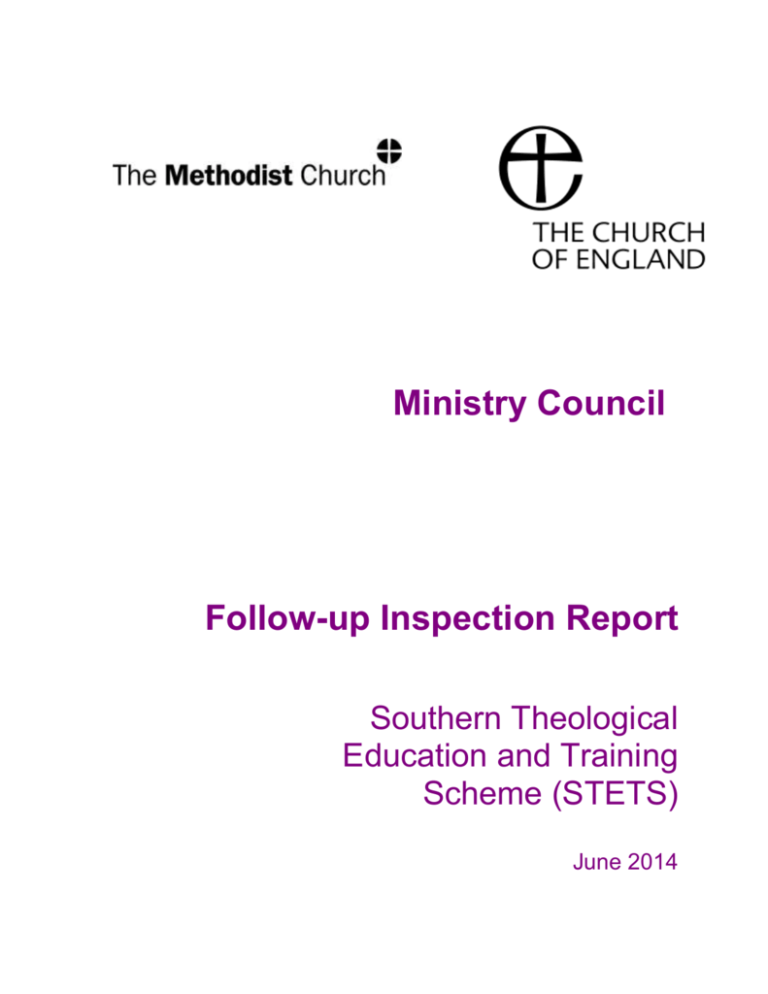
Ministry Council Follow-up Inspection Report Southern Theological Education and Training Scheme (STETS) June 2014 Ministry Division Church House Great Smith Street London SW1P 3AZ Tel: 020 7898 1412 Fax: 020 7898 1421 Published 2014 by the Ministry Division of the Archbishops’ Council Copyright © The Archbishops’ Council 2014 Southern Theological Education and Training Scheme (STETS) Senior Inspector’s follow-up Report on the Response by STETS to the Recommendations of the February-April 2013 Report of the Inspectors June 2014 INTRODUCTION With a fellow member of the 2013 inspection team, Revd Dr Mathew Philip, I visited STETS at Sarum College on 20th June 2014 and we met the Principal, Revd Dr David Holgate; Vice-Principal, Revd Dr Anne Claar Thomasson Rosingh; and the chair of the Management Committee, Mr Dudley Coates. David Hanson of Ministry Division supported the discussion. We are grateful to the STETS team for their openness and honesty in conversation and for their hospitality. David Holgate and his colleagues brought us up to date on staff changes since our inspection visit of Spring 2013. Staff numbers had reduced: one tutor had moved to Queen’s and another to Methodist Church House in the second half of last year. Early in 2014 two further staff members had left, one on voluntary redundancy while continuing to mentor and develop clergy in the role of training incumbents and pastoral supervisors. In April 2014 the Revd Paul Burden had been appointed part time (0.8) as Director of Ministry and E-Learning. The core staff complement was now 4.7, including the full-time Academic Programme Leader and part-time (0.9) Administrator. Our 2013 inspection report had reflected on the strengths of STETS as a regional course: its ecumenical spirit and history (while adjusting to the recent reality of a largely Anglican make-up), its culture of diversity, the quality of its teaching, and the excellence of its virtual learning environment (VLE) and provision for learning across a dispersed community, backed up by very good IT support. At the same time, STETS faces serious external challenges – ‘a good Course in a cold climate’ was our summary of its position last year. The Methodist Church’s decision to concentrate its ministerial and discipleship training in two centres, and thus to cease training via STETS, has substantially reduced the scheme’s future income prospects, and has created the business and financial need to secure viable student intake and income in other ways. The Methodist Church fully funds its few remaining students at STETS, but the financial position after their departure is serious, with new ordinand numbers from sponsoring dioceses simply not holding up in a way that is needed to ensure sustainability of the Course. Church of England student numbers are in the mid-teens for each of the last three years, and clearly short of the 25 per year that, on STETS’ calculations, are needed to sustain a break-even position as a stand-alone scheme. We comment further under recommendations 12 and 13 in the context of the Trustees’ exploration of alternative options for the course’s future. As our Follow-up Report reflects, STETS’ responses to almost all of the recommendations of our 2013 report, aside from financial matters, have been commendable. The recommendations of the 2013 Inspection Report are set out below in bold. STETS’ account of progress made on each point, incorporating the course’s initial action plan response and a more recent update where applicable, follows each recommendation in italics. The comments of the Senior Inspector follow on in regular type for each recommendation. Recommendation 1 We recommend that STETS should continue its exploration of ways to draw upon Salisbury Cathedral as an Anglican formational resource. Three academic staff members have met with representatives of the Cathedral on a number of occasions since the Inspection. With the help of Canon Sarah Mullally we have established a process of worshipping together, getting to know one another better and sharing in teaching opportunities. We begin every residential weekend with Evensong in the Cathedral. Canon Tom Clammer, the Precentor, and Canon Sarah Mullally have taught at residential weekends on liturgy and prayer respectively. Sarah Mullally recently second-marked our Ethics assignments. Good progress. We were pleased to learn of measures taken by STETS to draw more fully upon the resource of Salisbury Cathedral, its people and its worship. We understand the involvement of Cathedral staff in STETS teaching is on an informal rather than contractual footing, which is reasonable. A positive step is the commencement of residential weekends with the Cathedral’s Friday evensong, followed by a short reflection led by the Canon Treasurer, which we hear is well received by students. Recommendation 2 We recommend that the Course moves swiftly to identify a qualified liturgy tutor responsible for: (a) overall supervision of worship and worship feedback in the residential components of the Course; (b) co-ordination of the information and advice to students on the crafting of services and 4 (c) encouraging among students a confident use of set authorized forms and the role and use of the Psalter in its liturgical context. This year we have strengthened our training to lead Anglican worship in various ways. The new first year group, made up only of Anglicans, was introduced to authorised forms of worship at their Orientation weekend. All three year groups now begin their residential weekends with Evensong in the Cathedral. We have taken students to distinctive Anglican (and other) services in Salisbury on selected Sundays of weekends, and then reviewed the content and experience with them afterwards. Services have included an 8am BCP, a Charismatic Evangelical Informal Communion Service, a Cathedral Sung Eucharist, City Life Church (formerly Swaythling Methodist Church) in Southamption, Quaker worship in Salisbury and Mass at an inner city Roman Catholic Church in Bristol. All visits have resulted in thoughtful conversations with staff, students and those who led the services. The Revd Paul Burden took up his post as Director of Ministry and E-Learning on 14 April. He comes with 19 years’ experience of Anglican ministry, most recently as Rector of Bathampton. One of his specialist teaching areas is homiletics. In addition to taking over responsibility for a number of BA modules, Paul will be teaching a new MA module entitled ‘Words and Music in Worship’ (TMM 43120). We have validated our BA and MA programmes alongside those offered by four dioceses in the South Central RTP. Academically, we are now part of the SCRTP TEI. This provides scope for teaching one another’s validated modules, including those on worship and liturgy, e.g. the Revd Dr Phillip Tovey’s MA module on Liturgy. We continue to explore opportunities for our students to share in Sarum’s liturgical and ecclesial teaching with the Revd Dr James Steven and Dr Louise Nelstrop. Louise recently taught the seminars for the MA module on ‘Studying Local Churches in Interdisciplinary Perspective’. Satisfactory progress. Cost constraints and reducing staff numbers have meant that STETS were not able to appoint a new liturgy specialist, but it was evident from our discussion that the scheme has sought to act in the spirit of the report’s recommendation, including by drawing on other teaching expertise within the South Central RTP. It is too early to judge from evidence whether students are now sufficiently equipped to design and lead worship (and, in particular, Anglican worship), which was an area of some concern in our 2013 report, but these are steps in the right direction. Recommendation 3 We recommend that more emphasis is placed on explaining the variety of church and faith traditions, how they arose and how they function now, so that students are aware of the theological, social and political implications of worship they encounter and deliver. 5 We welcome this as we value the diversity of traditions we have at STETS. We tackle such matters regularly in worship reviews and Worship Matters sessions, and we take this recommendation as an encouragement to do so more explicitly and to reflect on these aspects in our reviews of worship visits to other churches. All FdA and BA students now study our Ecclesiology module written by the Principal, who also leads the MA module on Ecclesiology (co-taught this year with Canon Julie Gittoes of Guildford Cathedral). The Principal and Director of Ministry both teach on Anglican ecclesiology and worship at weekends. Our new associate staff members who are acting as staff consultants, Canon Ann Philp and the Revd Jonathan Plows, both bring expertise in the sociopolitical area. We have piloted small group supervision at two weekends over the past academic year. Both went well, and we hope to maintain this in 2014-15. Satisfactory. The STETS team spoke of the diversity represented in its student make-up and formational experiences; but our concern was more specifically around whether students are fully equipped to understand and work with the range of traditions that they encounter. The response addresses that point satisfactorily, and we were pleased to hear of the inter-faith weekend’s new introductory dialogue session, led by a Roman Catholic priest, which provided students with a valued opportunity to engage with theological, social and political aspects of worship of another Christian tradition within the larger context of engaging with inter-faith issues. Recommendation 4 We recommend that the Course redoubles its efforts to commend the practice of Spiritual Direction or its equivalent as a necessary tool for ministers. We fully endorse this and staff consultants regularly raise this matter with their students and their training ministers. We raise this matter as part of our Orientation Weekend for new intakes. We also provide opportunities for all students to meet with our Chaplain, who also advises students on how to access spiritual direction. We review student experience of working with their spiritual director at the start of their second year and this is also addressed in the revision to the second year module on (1F) on worship and spirituality. Student engagement with the Learning Outcomes under Spirituality are reviewed again in module 2/3F Preparing for Public Ministry. Fully satisfactory. Students’ access to spiritual direction was enabled and monitored as above, and there was now a formal expectation that students should have some spiritual direction in place by the end of their first year in training. 6 Recommendation 5 We recommend that the Course addresses the issue of training ministers’ selection with DDOs and other relevant authorities with a view to ensuring more consistent support and participation. Despite a reduction in staff numbers, we continue to make the appointment, training and support of our Training Ministers a priority. All TMs are appointed in consultation with the training officer or DDO of sponsoring churches. Their attendance at training days has improved as we have offered them more supervision training and group supervision as part of the days’ programmes. The new person who is appointed will need to help us foster our work with them. Closer Partnership with the dioceses is essential. Working more closely with the RTP on our academic programmes is one way to develop this. A further constructive idea that we are implementing is to use some Training Ministers who are suitably qualified, and interested in theological education, to give students small-group supervision at residential weekends. Satisfactory progress. We heard from the STETS team that the take up for smallgroup sessions to train and support training ministers was increasing, and that pilot small group supervision for trainee students had been a positive new step. This area was now the responsibility of the newly-appointed Director of Ministry (replacing a half-time post). Recommendation 6 We recommend that the core staff put in place a more robust process to ensure that marked work is returned within an agreed period. The ‘long thin’ module which caused these concerns (D2) has been discontinued for FdA and BA students and marking is being returned in a timely manner. We now aim to meet the University of Winchester guidelines of returning marked work within 15 working days (3 weeks). Smaller cohort sizes make this more feasible, but it should be noted that Winchester only introduced this shorted marking period (it used to be 6 weeks) during this academic year. Under normal circumstances this is achievable. Good progress. Working within the South Central RTP to deliver Common Awards from Autumn 2014, STETS will clearly need to comply with the academic assessment requirements of Durham University. Recommendation 7 Action should be taken to: 7 (a) add an ordained Anglican woman onto the staff complement as soon as circumstances allow; and (b) provide greater modelling of different patterns of diaconal and priestly ministry in the Anglican tradition through additional ordained Anglican involvement in residential components. We have recently appointed Canon Ann Philp to act as staff consultant to a third year group. Her membership of our staff team and participation in third year weekends has gone some way towards responding to recommendation 7a. Revd Dr Anne Claar Thomasson Rosingh will be ordained deacon on 29 June and will serve her title at STETS with parish placements arranged and overseen by Ann Philp. We have also appointed the Revd Jonathan Plows as a first year staff consultant. The Revd Andy Edmeads continues as a third year staff consultant. The Revd Margaret Jones joined STETS as Methodist Oversight Tutor till the summer of 2015. She brings experience of working ecumenically in the North Thames Ministerial Training Course. Fully satisfactory. Dr Thomasson Rosingh’s ordination as deacon in the Church of England – the journey of discernment beginning long before our inspection report – meets part (a) of this recommendation; and she spoke of how her associated learning and formational experiences had provided valuable additional common ground to share with students. As to (b), we noted that it would soon be the case that all core staff of STETS are active in Church of England life and ministry. Recommendation 8 We recommend that the process by which the Chair of the Board of Trustees manages staff appraisals should be reviewed with special attention to the provision of feedback from the Trustees to the Principal. Recommendation 9 The Trustees should ensure that all staff appraisals are carried out annually. The new Chair of Trustees has now examined all the recent staff appraisals and conducted an appraised for the Principal combined with a Senior Staff Review on 10 March 2014. Because of other pressing matters, the appraisal system itself has not yet been reviewed by the Trustees. The Principal has conducted appraisals of all core academic staff and administrative staff for the academic year 2012-13; the Chair of Trustees has seen and approved the reports. Satisfactory progress. We learnt that the Principal’s appraisal took place in March 2014, that staff appraisals for 2012/13 were completed and those for 2013/14 were 8 scheduled in the next few weeks, and we were satisfied that the Trustees had proper ownership and oversight of the process, subject to fuller review as indicated in the above response. Recommendation 10 Trustees need to become more deeply informed about the core work of STETS and in particular the delivery of courses by occasional attendance at residential weekends and the Spring School. Trustees were invited to our 2014 weekends and Spring School. The Chair attended and Licensed Paul Burden during our Maundy Thursday Eucharist. Some progress. We heard from the STETS team that progressing this recommendation more actively and formally incorporating new Trustees had waited on the more urgent matters addressed at Recommendations 12 and 13. Trustees had expressed willingness to take the steps asked, but would be helped if staff were to guide them on when their attendance and participation might be most beneficial. Trustees would also benefit from the experience of the environment at a Residential Weekend. Recommendation 11 There needs to be action on acquiring a set of Trustees with the range of expertise required; a Handbook for Trustees should be produced outlining their responsibilities. The Appointments Panel of the Trustees already works with a document to guide Trustee appointments. This document will be reviewed at the next Trustees’ meeting. In preparation for this, the Principal has consulted the Principals of other Courses to ask whether they have Trustees’ Handbooks which they could share with us, but with little response so far. Because of wider concerns about the future of STETS, the Trustees have delayed appointing new members, but the Management Committee has benefited from a new member with relevant gifts and experience. Progress awaited, but we understand the reasons behind not giving priority to the Trustee Handbook at this stage. Recommendation 12 We recommend that STETS develops a more active programme to promote its work and profile with existing and potential customers in the region and beyond. 9 This task has already been on the agenda of all the STETS Boards, has been the major focus of the Trustees since September 2013, and is ongoing. The Principal and Vice Principal met with students to do some initial work on this in mid August and formed a task group that resulted in a major revision to our Prospectus for 2014-15. Paul Burden has been appointed as Director of Ministry and E-Learning to reflect our desire to develop and enhance our online presence. We validated full time pathways with Durham in March 2014 and our new intake has a better gender balance and age profile. The joint curriculum submission with the dioceses in the RTP generated a deeper sense of partnership amongst theological educators. The major problem we face is that the regional bishops are not clear about whether they want a regional course, or wish to establish their own diocesan courses. Conversation with DDOs indicates that there is a reduced demand for part-time training and more of a demand for full-time training for younger ordinands with families. Such ordinands would benefit from being trained at STETS, rather than at a residential college, and so we will be offering fulltime training in both our BA and MA programmes from 2014 and will be advising DDOs and Dioceses of this. STETS and other courses offering a mixed mode training routes (such as St Mellitus) are in ongoing discussion with Ministry Division about receiving adequate funding for such pathways. See our comments under Recommendation 13. Recommendation 13 Urgent consultation and engagement is required between the Council and the Board of Trustees in order to address the question, in the light of their financial situation, of how the training provision offered by STETS can be maintained beyond the short-term. This matter has been actively pursued during the last academic year, being addressed by academic collaboration with the SCRTP and more fully so by a proposed merger with the SCRTP TEI. The Chair of Trustees brought a recommendation to the Trustees’ meeting on 10 July 2014. The history over the last year is that in Nov 2013, the Bishop of Salisbury initiated a consultation process which he hoped would lead to closer co-operation and mutual support between STETS, the Cathedral, Salisbury Diocese and Sarum College. This was conducted by his nominee, Bishop Peter Price, but the outcome was inconclusive. At a follow up meeting in Dec 2013, it was agreed to 10 explore a merger of STETS, Sarum College and the Diocese of Salisbury’s Learning for Discipleship and Ministry Team. This was vigorously pursued during the Spring term, but reduced into a proposal for Sarum College to take over STETS. This was rejected by the STETS Trustees at a meeting on 31 March and an alternative proposal to explore whether STETS could merge instead with the SCRTP TEI was agreed. The Diocesan Bishops of the region have now met and have asked us to return to the idea of a merger with Sarum College, with the idea of an RTP scheme as a possible longer term aim. STETS is now in a stronger position financially than it was earlier in the year - with our current numbers we will still have £105k in the bank at the end of the year - and this will make negotiations easier. The STETS Trustees are to consider this option further at their meeting in early September. Ongoing – and still a real challenge. With the STETS team we discussed student numbers and income, as we note in the introduction to this report. Even given the better financial position noted above, there must be a question about viable numbers both financially and in terms of cohort experience. It is evident that, for whatever reason, not all of the Course’s former sponsoring dioceses in the Church of England are now making STETS their choice for students, and in at least one case we heard that a decision, or its communication, is being unhelpfully deferred. The major task is now to establish and build up stakeholders’ support for the distinctive nature of what is currently STETS as a mode of ministerial training and independent learning, however that might be merged and/or rebranded. It is not our role at this follow-up stage in the inspection cycle to make further specific recommendations, but we offer the following reflections: i. STETS’ excellent VLE, one of the scheme’s clear strength as we note in our 2013 report, need not be a rival to the Durham-Common Awards offer. STETS’ VLE material and its varied on-line support systems for learning and interaction could comfortably exist within the larger Durham VLE, and could be one way of drawing in new interest and custom. ii. Granted that VLE development on a more fully commercial basis would need the investment of some time, resource and expertise for a limited term, might not STETS look to do this? In particular, STETS could explore wider marketing of the material to independent students using the web and in particular social media. iii. To achieve this, some short-term investment in a marketing push might prove worthwhile. The new prospectus (see STETS’ commentary under Recommendation 12) is a good step in that direction. It makes much of the Course’s new full-time context-based training pathway. But how energetically has this been publicised and ‘sold’ among key stakeholders? In particular, as the course has particular strengths in its VLE, the use of the web and Social Media should be a natural extension. 11 iv. Given that STETS has much work to do to persuade Dioceses to consider sending students to STETS, a Trustee specialising in marketing would be an asset worth considering. v. We are aware of a perception that the Course’s Trustees are somewhat risk-averse and that, even while valuable additional skills and talents might be available to the Trustees, there is a reluctance at this pressurised time to put energy into replacing and training new members. The response to recommendations 10 and 11 above bears this out. The STETS team have made considerable sacrifices by reducing staff numbers and yet maintaining a team able to deliver the full programme covering FDA and BA level and ordination training. We wonder whether a change of stance by the Trustees might pay off in this instance? vi. Merger within the South Central RTP may prove the right course. We take no particular view on this, but possible benefits to factor in could certainly include: i) re-shaping the staff complement over time and as opportunities naturally occur; ii) reduced accommodation rental costs, assuming a move of offices away from Sarum; while iii) the benefit of the Salisbury/Sarum location for, say, teaching, other gathered events or worship, might still be available on a new financial basis. As we said in our earlier report, we believe STETS offers a very good course. Its distinctive model of dispersed learning through the use of local tutors, diversity, the depth and resource of its VLE, and the potential of its new full-time contextual training, add up to a unique educational and formational TEI in the Church’s overall economy of training for ministry and discipleship. The Inspectors believe that it would be a serious matter for regret if this provision were to be lost to the Church; and we very much hope that in some form, however reshaped or renamed, it will not be. This will, however, require STETS to put real energy behind convincing its key partners, stakeholders and potential customers of its distinctive value and a renewed commitment from regional partners and stakeholders. J MALTBY The Revd Canon Dr Judith Maltby, Senior Inspector M PHILIP The Revd Dr Mathew Philip, Inspector 11 August 2014 12
